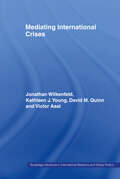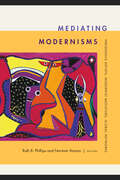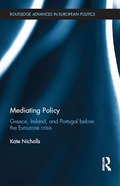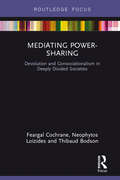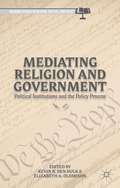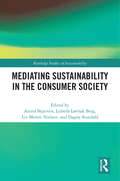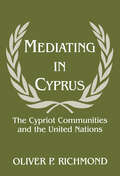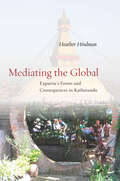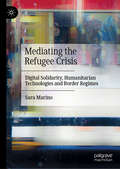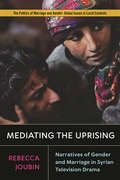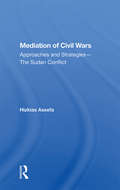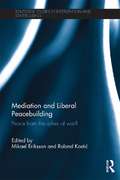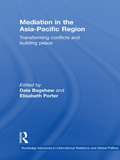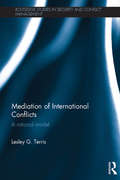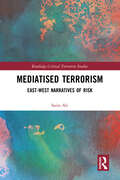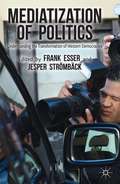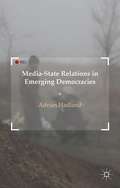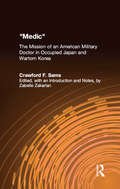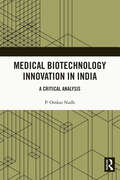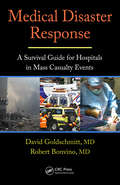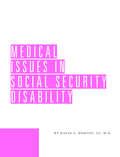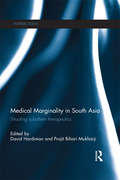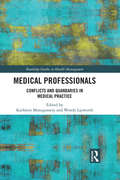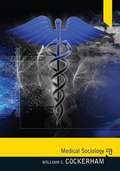- Table View
- List View
Mediating International Crises (Routledge Advances in International Relations and Global Politics #34)
by Jonathan Wilkenfeld Kathleen Young David Quinn Victor AsalThis new book shows how international crises are dangerous episodes that can be destabilizing not only to the actors directly involved but also to the entire international system. Recognizing the primacy of crises as defining moments in international relations, scholars and policy makers alike are increasingly concerned with identifying mechanisms for crisis prevention, management and resolution. Mediating International Crises is the first comprehensive study into one such mechanism that has been used with increasing frequency in the 20th Century: mediation by a third party. This important research attempts to determine whether third party mediation is an effective means of alleviating or managing the turbulent and violent consequences of crises. The authors examine three approaches to mediation: facilitation communication between parties, formulating possible agreements and manipulating the parties through sanctions or rewards. They explore how these mediation approaches affect crisis outcomes through sanctions or rewards The book begins with a thorough discussion of the theoretical literature on mediation, with particular attention paid to the important distinction between crisis management and conflict resolution. The authors then provide empirical analyses of instances of mediation in 20th century international crises, which is supplemented with data derived from simulated negotiation settings with human subjects.
Mediating Modernisms: Indigenous Artists, Modernist Mediators, Global Networks (Objects/Histories)
by Ruth B. Phillips Norman VoranoMediating Modernisms explores the fertile exchanges between Indigenous artists living in colonial societies and the mid-twentieth century mediators who carried ideas of aesthetic modernism and modernist primitivism into these worlds. Spanning South Africa, North America, Australia, Scandinavia, New Zealand, Brazil, Nigeria, and India, the case studies examine the mediators who played the role of mentors, friends, and patrons to Indigenous artists. Their relationships constituted complex mutual exchanges of aesthetic ideas and practices that inspired artists to create new fusions of modernism with Indigenous art traditions and that reflected their negotiations between affiliation with tradition and embrace of technology, newness, and metropolitan patronage. Challenging current understandings of modernist primitivism and elucidating the creation of the “global contemporary” art world, this volume reveals broader historical patterns, shared ideological and aesthetic dynamics, and the structural parallels that link mediators and Indigenous artists to globally circulating artistic ideas and geopolitical forces.Contributors. Peter Brunt, Roberto Conduru, Hanna Horsberg Hansen, Elizabeth Harney, Jyotindra Jain, Sandra Klopper, Ian McLean, Anitra Nettleton, Chika Okeke-Agulu, Ruth B. Phillips, Una Rey, Megan Tamati-Quennell, Nicholas Thomas, Norman Vorano, Mark Andrew White
Mediating Policy: Greece, Ireland, and Portugal Before the Eurozone Crisis (Routledge Advances in European Politics)
by Kate NichollsAmongst the most serious consequences of the 2008 global financial collapse and sovereign debt crisis were a series of unprecedented international bailouts for Greece, Ireland, and Portugal between 2010 and 2011. This book analyses the development policies of Greece, Ireland, and Portugal between 1990 and 2008, before the Eurozone crisis. It identifies national-level differences between the policy strategies and outcomes that have characterized recent developments in the Greek, Irish, and Portuguese political economies. In addition, it provides an explanation for these differences that takes into account variations in political institutions and state-society relations. In doing so, it locates an explanation for policy divergence in the presence or absence of the policy-making institutions and processes that make up a 'zone of mediation'. Overall, it argues there is significant variation in the extent to which Ireland, Portugal and Greece have adapted their developmental goals and strategies in order to address the labour market challenges posed by the post-industrial era. This book will be of key interest to students and scholars of European politics and studies, comparative political economy, public policy/policy studies, and democracy studies.
Mediating Power-Sharing: Devolution and Consociationalism in Deeply Divided Societies
by Feargal Cochrane Neophytos Loizides Thibaud BodsonThis book focuses on the design and operation of power-sharing in deeply divided societies. Beyond this starting point, it seeks to examine the different ways in which consociational institutions emerge from negotiations and peace settlements across three counter-intuitive cases – post-Brexit referendum Northern Ireland, the Brussels Capital Region and Cyprus. Across each of the chapters, the analysis assesses how the design or mediation of these various forms of power-sharing demonstrate similarity, difference and complexity in how consociationalism has been conceived of and operated within each of these contexts. Finally, a key objective of the book is to explore and evaluate how ideas surrounding power-sharing have evolved and changed incrementally within each of the empirical contexts. The unifying argument within the book is that power-sharing has to have the capacity to adapt to changing political circumstances, and that this can be achieved through the interplay of formal and informal micro-level refinements to these institutions and the procedures that govern them, that allow such institutions to evolve over time in ways that increase their utility as conflict transformation governance structures for deeply divided societies. This book fills the gap in the published literature between theoretical and empirical studies of power-sharing, and will be of much interest to students of peace and conflict studies, consociationalism, European politics and IR in general.
Mediating Religion and Government
by Kevin R. Den Dulk Elizabeth A. OldmixonThe study of religion and politics is a strongly behavioral sub-discipline, and within the American context, scholars place tremendous emphasis on its influence on political attitudes and behaviors, resultuing in a better understanding of religion's ability to shape voting patterns, party affiliation, and views of public policy.
Mediating Sustainability in the Consumer Society (Routledge Studies in Sustainability)
by Dagny Stuedahl Astrid Skjerven Lisbeth Løvbak Berg Liv Merete NielsenThis book sheds light on the role and impact of sustainability mediation, an effective tool for political authorities and business enterprises to persuade consumers of the integrity of their actions, products, and services.In this era of ecological and societal crises fuelled by increasing consumption, sustainability has become a key buzzword and target to attain. Governments around the world argue that they will meet their sustainability goals through environmental actions, by enabling consumers to make better choices and expecting brands to respond accordingly. At the same time, consumers are overwhelmed by the messaging conveyed in sustainability marketing campaigns, often featuring misleading greenwashing, with political authorities, organisations, and business enterprises all having conflicting interests. In this complex scenario, mediation has become a crucial issue. This book offers a critical and multidisciplinary view of sustainability mediation from experts in the fields of philosophy, consumption research, media studies, fashion, design, and citizenship, offering a unique, holistic view. Each chapter highlights different and problematic aspects of the cultural narratives being communicated, for example, the necessity of growth and the notion of a green economy. They present current theories, methods, indicators, and strategies used to assess and measure the relation between mediation, behaviour, and sustainable development.This book is of interest to scholars, researchers, and postgraduate students in all subject fields concerned with sustainability, including design, visual communication, fashion, consumption, media and journalism, and sustainable development.
Mediating in Cyprus: The Cypriot Communities and the United Nations
by Oliver P. RichmondThe UN peacemaking operation in Cyprus has been one of the longest of its kind, but has resulted in discarded proposals, non-papers or reports. This study investigates the Cypriot parties' views of peacemaking, to shed light on the problem, and on the theoretical debates surrounding mediation.
Mediating the Global: Expatria's Forms and Consequences in Kathmandu
by Heather HindmanTransnational business people, international aid workers, and diplomats are all actors on the international stage working for organizations and groups often scrutinized by the public eye. But the very lives of these global middlemen and women are relatively unstudied. "Mediating the Global" takes up the challenge, uncovering the day-to-day experiences of elite foreign workers and their families living in Nepal, and the policies and practices that determine their daily lives. In this book, Heather Hindman calls for a consideration of the complex role that global middlemen and women play, not merely in implementing policies, but as objects of policy. Examining the lives of expatriate professionals working in Kathmandu, Nepal and the families that accompany them, Hindman unveils intimate stories of the everyday life of global mediators. "Mediating the Global" focuses on expatriate employees and families who are affiliated with international development bodies, multinational corporations, and the foreign service of various countries. The author investigates the life of expatriates while they visit recreational clubs and international schools and also examines how the practices of international human resources management, cross-cultural communication, and promotion of flexible careers are transforming the world of elite overseas workers.
Mediating the Refugee Crisis: Digital Solidarity, Humanitarian Technologies and Border Regimes
by Sara MarinoThis book looks at how Europe’s refugee crisis has provoked different political and humanitarian responses, all similarly driven by technology. The author first explores the transformation of Europe into an increasingly militarised space, where technologies are mainly used to exercise surveillance and to distinguish between citizens and unwanted migrants. She then shifts the attention to refugees’ practices of connectivity by looking at how technologies are used by refugees to communicate, perform and resist their exile. Finally, the book examines the opportunities and challenges that characterise the impact of digital social innovation in humanitarian settings. By focusing on how technologies are used to promote solidarity in crisis contexts, the volume provides an original contribution to studying the role of tech for good activism within the space of Fortress Europe. Based on interviews with refugees, digital humanitarians and social entrepreneurs, the book timely questions what Europe means today, and why dialogue is now more important than ever.
Mediating the Uprising: Narratives of Gender and Marriage in Syrian Television Drama (Politics of Marriage and Gender: Global Issues in Local Contexts)
by Rebecca JoubinMediating the Uprising: Narratives of Gender and Marriage in Syrian Television Drama shows how gender and marriage metaphors inform post-uprising Syrian drama for various forms of cultural and political critique. These narratives have become complicated since the uprising due to the Syrian regime’s effort to control the revolutionary discourse. As Syria’s uprising spawned more terrorist groups, some drama creators became nostalgic for pre-war days. While for some screenwriters a return to pre-2011 life would be welcome after so much bloodshed, others advocated profound cultural and social transformation, instead. They employed marriage and gender metaphors in the stories they wrote to engage in political critique, even at the risk of creating marketing difficulties for the shows or they created escapist stories such as transnational adaptations and Old Damascus tales. Serving as heritage preservation, Mediating the Uprising underscores that television drama creators in Syria have many ways of engaging in protest, with gender and marriage at the heart of the polemic.
Mediation Of Civil Wars: Approaches And Strategies--the Sudan Conflict
by Hizkias AssefaAs civil wars become forums for international conflicts and ideological rivalries, their containment and resolution is an increasingly important requisite for international peace. This book explores mediation as a means toward resolving such wars. Dr. Assefa argues that the sovereign sensitivities of incumbent governments, the risk of international
Mediation and Liberal Peacebuilding: Peace from the Ashes of War? (Routledge Studies in Intervention and Statebuilding)
by Mikael Eriksson Roland KostićThis book offers a state-of-the-art examination of peacemaking, looking at its theoretical assumptions, empirical applications and its consequences. Despite the wealth of research on external interventions and practices of Western peacebuilding, many scholars tend to rely on findings in the so-called 'post-agreement' phase of interventions. As a result, most mainstream peacebuilding literature pays limited or no attention to the linkages that exist between mediation practices in the negotiation phase and processes in the post-peace agreement phase of intervention. By linking the motives and practices of interveners during negotiation and implementation phases into a more integrated theoretical framework, this book makes a unique contribution to the on-going debate on the so-called Western ‘liberal’ models of peacebuilding. Drawing upon in-depth case-studies from various different regions of the world including Bosnia-Herzegovina, Kosovo, Afghanistan, Sudan, Ivory Coast, Senegal and Sierra Leone, this innovative volume examines a variety of political motives behind third party interventions, thus challenging the very founding concept of mediation literature. This book will of much interest to students of peacebuilding, statebuilding, peacemaking, war and conflict studies, security studies and IR in general.
Mediation in the Asia-Pacific Region: Transforming Conflicts and Building Peace (Routledge Advances in International Relations and Global Politics)
by Dale Bagshaw Elisabeth PorterThis book examines mediation in connection with peacebuilding in the Asia-Pacific region, providing practical examples which either highlight the weaknesses within certain mediation approaches or demonstrate best-practice. The authors explore the extent to which current ideas and practices of mediation in the Asia-Pacific region are dominated by Western understandings and critically challenge the appropriateness of such thinking. Featuring a range of case studies on Fiji, Vanuatu, Papua New Guinea, Malaysia, Vietnam, China, Singapore, Indonesia, the Philippines and Thailand, this book has three main aims: To challenge dominant Western practices and ways of thinking on mediation that currently are being imposed in the Asia-Pacific region; To develop culturally-fluent and socially just mediation alternatives that build upon local, traditional or religious approaches; To situate mediation within ideas and practices on peacebuilding. Making a unique contribution to peace and conflict studies literature by explicitly linking mediation and peacebuilding practices, this book is a vital text for students and scholars in these fields.
Mediation of International Conflicts: A Rational Model (Routledge Studies in Security and Conflict Management)
by Lesley G. TerrisThis book examines the use of third-party mediation as a conflict resolution method. In an attempt to explain why some, but not all, conflicts are mediated, this work argues that diverse conflict structures are inherently different in their susceptibility to mediation attempts. By offering a systematic method for measuring the transformability of conflict structures, this book contributes to our understanding of the sufficient and necessary conditions for mediation. In addition, the study offers an analytical framework for the examination of mediation as a trilateral rational bargaining process. Although the general concept of mediation as a three-person game is not new, most studies focus on either the disputants' perspectives or the mediator's perspective. In contrast, this study integrates the perspectives of all three parties. The framework links the different stages involved in the whole process of mediation, from the onset of mediation, through the mediation strategies used, to the outcome, rather than focusing on one particular aspect. The book applies the framework to two case studies – the conflict between Israel and Egypt and the conflict between India and Pakistan – and provides new insights into these conflicts from a mediation perspective. In general, the model developed here provides a framework for systematically assessing conflicts and the options available to those involved in the mediation process. This book will be of much interest to students of conflict resolution, mediation, war and conflict studies, Asian politics, Middle Eastern politics and IR in general.
Mediatised Terrorism: East-West Narratives of Risk (Routledge Critical Terrorism Studies)
by Saira AliThis book offers an East-West comparative analysis of mediatised terrorism. This is the first country-specific analysis of the mediatisation of terrorism, with Pakistan and Australia representing the two worlds, respectively. Caught up in the ‘9/11 effect’, Australia is known for its anti-terror ‘hyper-legislation’, despite the implausible nature of the threat. In contrast, Pakistan is plagued by terrorism, yet the military establishment favours a duplicitous policy of fighting militant groups selectively. To understand how the two diverse cultural sites, with their very different experiences of terrorism, make sense of this unpredictable threat, the book uses Beck’s World Risk Society theory as a conceptual framework to examine the production and construction of news narratives around the risk of terrorism in both countries through textual analysis of local news stories and in-depth interviews with Australian and Pakistani journalists. Narratives about ‘global terrorism’ are mostly ‘Western’, with fear of its impact on ‘Western’ democracy and civilisation. This book aims to fill the gap and present a nuanced understanding of global terrorism by examining the characteristics of the phenomenon in a Western as well as an Eastern location and the ways in which the risk of terrorism is being played out in the two worlds. This book will be of much interest to students of critical terrorism studies, media studies, Asia-Pacific politics, and International Relations.
Mediatization of Politics
by Jesper Str�mb�ck Frank EsserThe first book-long analysis of the 'mediatization of politics', this volume aims to understand the transformations of the relationship between media and politics in recent decades, and explores how growing media autonomy, journalistic framing, media populism and new media technologies affect democratic processes.
Media�State Relations in Emerging Democracies
by Adrian HadlandThe news media and the state are locked in a battle of wills in the world's emerging democratic states. It is a struggle that will determine whether or not democracy flourishes or withers in the 21st century. Using a number of case studies, including South Africa, this book evaluates what is at stake.
Medic: The Mission of an American Military Doctor in Occupied Japan and Wartorn Korea
by Crawford F. Sams Zabelle ZakarianIn the aftermath of the bombing of Hiroshima and Nagasaki, Crawford F. Sams led the most unprecedented and unsurpassed reforms in public health history, as chief of the Public Health and Welfare Section of the Supreme Commander of Allied Powers in East Asia. "Medic" is Sams's firsthand account of public health reforms in Japan during the occupation and their significance for the formation of a stable and democratic state in Asia after World War II. "Medic" also tells of the strenuous efforts to control disease among refugees and civilians during the Korean War, which had enormously high civilian casualties. Sams recounts the humanitarian, military, and ideological reasons for controlling disease during military operations in Korea, where he served, first, as a health and welfare adviser to the U.S. Military Command that occupied Korea south of the 38th parallel and, later, as the chief of Health and Welfare of the United Nations Command. In presenting a larger picture of the effects of disease on the course of military operations and in the aftermath of catastrophic bombings and depravation, Crawford Sams has left a written document that reveals the convictions and ideals that guided his generation of military leaders.
Medical Biotechnology Innovation in India: A Critical Analysis
by P Omkar NadhThis book examines the medical biotechnology industry in India through the lens of critical political economy. It discusses the sharp trajectory of growth in the biotechnology business and the state of investments, subsidies and patents which propelled the rise of the industry in India. The book uses in-depth interviews and case studies to analyse the roles of various financial actors, state institutions, and academia in the medical biotechnology ecosystem. Focusing on the relationship between India’s neo-liberal policies and the swift growth of the industry, the author examines the merits and demerits of the current market-driven biomedical ecosystem exploring the trends in the industry, bio-medical start-ups, the use of human resource and capital accumulation process. The book reiterates and emphasizes the need for the democratization of scientific and medical work and for striking a balance between economic gains and public health priorities. Comprehensive and insightful, this book will be of interest to scholars and researchers of science technology society studies, public health, economics, business studies, medical sociology, public policy, and political science.
Medical Disaster Response: A Survival Guide for Hospitals in Mass Casualty Events
by David Goldschmitt Robert BonvinoWhile the job of a clinician in a disaster scenario is to save lives without regard for the cause or rationale for the injury, medical and emergency professionals who understand the diverse aspects of a disaster are better equipped to respond effectively. Giving emergency personnel the tools they need to perform in catastrophic situations, Medical
Medical Evidence
by Thomas Quinn James LawlorMedical Evidence When litigating difficult-to explain medical issues, pictures are worth a lot more than a thousand words. Unfortunately, medically-accurate illustrations can cost hundreds of dollars each. Here is affordable help. Thomas Quinn and James Lawlor's Medical Evidence will equip you to handle medical topics with confidence and authority, providing: * Over 400 detailed medical illustrations * Anatomy in plain English * Case studies of common injuries * Questions and answers for experts * Sources of additional information These are not simple line drawings you usually find in law books. Medical Evidence contains professional-quality illustrations and photographs of extraordinary detail. All are labeled and supported by textual discussions.
Medical Issues in Social Security Disability
by David MortonAuthor Dr. David Morton has personally made more than 50,000 disability determinations for the Social Security Administration. As a Chief Medical Consultant, he hired, trained, supervised, and evaluated the work of both medical doctors and clinical psychologists. Now, Dr. Morton has made his expertise available to claimants' representatives with Medical Issues in Social Security Disability, a revealing and practical look inside the SSA's medical evaluation system. This comprehensive book explains how the SSA interprets key Listings: * What symptoms, physical signs, laboratory test abnormalities, and regimen response are needed to qualify, * The medical data which should be included in the claimant's file to obtain a favorable decision, and * Common issues faced by the claimant or the SSA, with a heavy focus on residual functional capacity. The book is filled with nuggets about shortcomings in submitted medical records, the types of mistakes adjudicators are most likely to make, where generous allowances are provided claimants, ailments and tests frequently overlooked by treating doctors, and much more.
Medical Marginality in South Asia: Situating Subaltern Therapeutics (Intersections: Colonial and Postcolonial Histories)
by Projit Bihari Mukharji David HardimanExamining the world of popular healing in South Asia, this book looks at the way that it is marginalised by the state and medical establishment while at the same time being very important in the everyday lives of the poor. It describes and analyses a world of ‘subaltern therapeutics’ that both interacts with and resists state-sanctioned and elite forms of medical practice. The relationship is seen as both a historical as well as ongoing one. Focusing on those who exist and practice in the shadow of statist medicine, the book discusses the many ways in which they try to heal a range of maladies, and how they experience their marginality. The contributors also provide a history of such therapeutics, in the process challenging the widespread belief that such ‘traditional’ therapeutics are relatively static and unchanging. In focusing on these problems of transition, they open up one of the central concerns of subaltern historiography. This is an important contribution to the history of medicine and society, and subaltern and South Asian studies.
Medical Professionals: Conflicts and Quandaries in Medical Practice (Routledge Studies in Health Management)
by Kathleen Montgomery Wendy LipworthMedical Professionals: Conflicts and Quandaries in Medical Practice offers a fresh approach to understanding the role-related conflicts and quandaries that pervade contemporary medical practice. While a focus on professional conflicts is not new in the literature, what is missing is a volume that delves into medical professionals’ own experience of the conflicts and quandaries they face, often as a result of inhabiting multiple roles. The volume explores the ways in which these conflicts and quandaries are exacerbated by broader societal forces, including changing scientific and technological paradigms, commercialization, and strengthened consumer movements, which simultaneously expand the scope of roles and responsibilities that medical professionals are expected to fulfill, and make it more difficult to do so. Several empirical chapters analyze data from qualitative interview studies with clinicians and other stakeholders. The studies highlight the burdens on clinicians who are expected to make informed and justified judgments and decisions in the midst of competing pressures; authors describe the methods that clinicians use to address the associated tensions within specific contexts. Two conceptual chapters follow and offer some innovative ways to think about the challenges facing medical professionals as they strive to make sense of the changing landscape within healthcare. The first reflects on the challenges to clinical practice in the midst of shifting and often competing definitions of disease and associated ideologies of care. The second reflects more broadly on the utility of value pluralism as a framework for conceptualizing and working through moral and professional quandaries. The book concludes with a chapter containing suggestions for how members of the medical profession might reframe their thinking about their roles, responsibilities, and decision-making in the midst of inevitable quandaries such as those presented here. This book will be of vital reading for academics, researchers, educators, postgraduate students, and interested health care practitioners and administrators.
Medical Sociology (12th edition)
by William C. CockerhamFor upper-division undergraduate/beginning graduate-level courses in Medical Sociology, and for Behavioral Science courses in schools of Public Health, Medicine, Pharmacy, and Nursing. Offers a comprehensive overview of the most current issues in medical sociology. The standard text in the field, this best-selling introduction to medical sociology presents the most recent and relevant ideas, concepts, themes, issues, debates, and research findings. It contains first-person accounts from patients, physicians, and other health care providers. It is based on a worldwide review of the literature and provides the most recent health statistics, data, and studies available while identifying the most important trends and issues.
